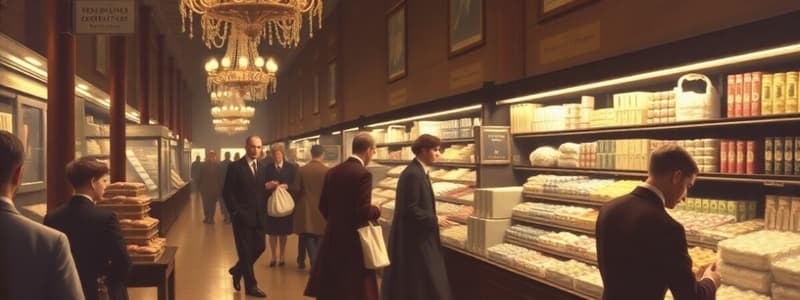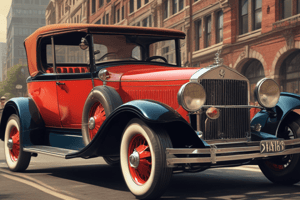Podcast
Questions and Answers
What was a significant characteristic of consumer behavior in the 1920s?
What was a significant characteristic of consumer behavior in the 1920s?
- Consumers favored buying essential goods only.
- Credit was rarely used for purchasing goods.
- Impulse buying became increasingly common. (correct)
- Most purchases were made with cash only.
What role did advertising play in the 1920s economy?
What role did advertising play in the 1920s economy?
- Advertisers focused solely on traditional print media.
- There was no significant change in advertising during this period.
- Advertising was largely ineffective at promoting products.
- Consumer psychology drove advertising techniques to evolve. (correct)
How did purchasing on credit influence the economy of the 1920s?
How did purchasing on credit influence the economy of the 1920s?
- Household debt levels fell significantly.
- It enabled more consumers to purchase goods over time. (correct)
- Most consumers avoided installment plans completely.
- It drastically reduced consumer spending.
What characterized the pop culture of the 1920s, often referred to as the Jazz Age?
What characterized the pop culture of the 1920s, often referred to as the Jazz Age?
What was a significant economic condition experienced in the American economy during the 1920s?
What was a significant economic condition experienced in the American economy during the 1920s?
What was one of the consequences of Calvin Coolidge's economic policies during the 1920s?
What was one of the consequences of Calvin Coolidge's economic policies during the 1920s?
What cultural phenomenon characterized the 1920s in America?
What cultural phenomenon characterized the 1920s in America?
What contributed significantly to the stock market crash in 1929?
What contributed significantly to the stock market crash in 1929?
What effect did consumerism have on American households by the end of the 1920s?
What effect did consumerism have on American households by the end of the 1920s?
Which factor contributed to the cultural developments of the Roaring Twenties?
Which factor contributed to the cultural developments of the Roaring Twenties?
Which of the following best describes the effects of the stock market crash of 1929?
Which of the following best describes the effects of the stock market crash of 1929?
How did companies in the 1920s contribute to the consumerist culture?
How did companies in the 1920s contribute to the consumerist culture?
Which major technological advancement did Henry Ford contribute to in the 1920s?
Which major technological advancement did Henry Ford contribute to in the 1920s?
What was the state of wealth inequality during the 1920s?
What was the state of wealth inequality during the 1920s?
What event marked the end of the prosperity of the Roaring Twenties?
What event marked the end of the prosperity of the Roaring Twenties?
Flashcards
Roaring Twenties economy
Roaring Twenties economy
A period in the 1920s with low unemployment, rising GDP, and a consumer-driven culture.
Consumerism (1920s)
Consumerism (1920s)
Increased availability of goods led to people buying more things in the 1920s.
1920s wealth inequality
1920s wealth inequality
Difference in wealth between the rich and the poor grew.
1920s technological advancements
1920s technological advancements
Signup and view all the flashcards
Henry Ford & Automobile Production
Henry Ford & Automobile Production
Signup and view all the flashcards
1920s Global Markets
1920s Global Markets
Signup and view all the flashcards
Wall Street Crash
Wall Street Crash
Signup and view all the flashcards
Household Debt
Household Debt
Signup and view all the flashcards
Jazz Age
Jazz Age
Signup and view all the flashcards
Flappers
Flappers
Signup and view all the flashcards
Coolidge Prosperity
Coolidge Prosperity
Signup and view all the flashcards
Buying on Credit
Buying on Credit
Signup and view all the flashcards
Overleveraged
Overleveraged
Signup and view all the flashcards
Black Thursday, Black Monday, Black Tuesday
Black Thursday, Black Monday, Black Tuesday
Signup and view all the flashcards
What were some causes of the 1929 stock market crash?
What were some causes of the 1929 stock market crash?
Signup and view all the flashcards
Study Notes
The American Economy of the 1920s
- The 1920s saw a significant economic boom in the US, characterized by low unemployment and inflation rates, and substantial GDP growth per capita. This era became known as the Roaring Twenties due to wealth improvements and rising consumerism.
- Wealth disparity widened during this period, yet many in the middle class experienced improvements in living standards due to technological advancements and increased efficiency in manufacturing.
- Consumerism was fueled by a rise in the availability of goods and easier access to credit. This, along with other macroeconomic factors, ultimately led to the 1929 stock market crash.
- The 1920s were not just an economic phenomenon, but a complex cultural and economic phenomenon with developments in literature, art, culture, and consumerism.
Causes of the Roaring Twenties
- The war's end in 1918 and resultant technological advancements significantly impacted consumer culture.
- War innovations were rapidly adopted into civilian life, fueling the consumerist culture of the 1920s.
Characteristics of American Companies in the 1920s
- Companies reacted to consumerism by developing new products and manufacturing methods.
- Henry Ford's innovations in automobile manufacturing led to a rise in car ownership.
- American companies expanded into global markets, and foreign companies sought access to the US's strong economy.
- Advertising evolved significantly thanks to radio, encouraging consumerism through targeted campaigns.
The Rise of Consumerism in the 1920s
- Mass-produced goods were more widely available at lower prices.
- High wages and credit facilities further encouraged consumer spending.
- New products like radios, cars, and appliances transformed daily life for most Americans.
- However, consumerism and overspending also created a potential for problematic debt accumulation and unnecessary purchases.
Buying on Credit in the 1920s
- Installment plans allowed consumers to buy goods over time, fueling significant consumer spending.
- Consumer debt more than doubled between 1920 and 1930.
- A major factor contributing to the 1929 crash, this increase in debt was significantly problematic.
Pop Culture in the 1920s
- Pop culture became much more liberal and free-spirited than in previous decades.
- The Jazz Age saw the rise of jazz music, a new youth culture, and classic Hollywood films.
- Flappers, independent women defying traditional norms, became cultural icons showcasing a rising spirit of women's liberation through their lifestyle choices.
Coolidge Prosperity in the 1920s
- President Calvin Coolidge oversaw a period of economic prosperity characterized by a hands-off regulatory approach to businesses and tax cuts.
- His policies were popular during the time but were later criticized for ignoring wealth inequality and contributing to the 1929 stock market crash.
The Stock Market in the 1920s
- The stock market experienced rapid, unsustainable growth fueled by consumer spending and corporate profits.
- Market speculation and excessive leverage led to an overvalued market that could not sustain its growth.
- Personal investors increased considerably during this period.
1929 Stock Market Crash
- The October 1929 crash was a multi-faceted event caused by overinflated stock prices, consumer debt, international agricultural problems, rising interest rates, and panic.
- 'Black Thursday', 'Black Monday', and 'Black Tuesday' marked the beginning of the major crash.
- This crash triggered the Great Depression, devastating American society throughout the 1930s.
Studying That Suits You
Use AI to generate personalized quizzes and flashcards to suit your learning preferences.




